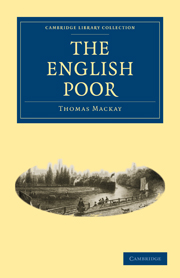Book contents
- Frontmatter
- PREFACE
- Contents
- CHAPTER I PROPERTY THE MAIN CONDITION OF SURVIVAL. THE GENERAL PROPOSITION STATED
- CHAPTER II THE SAME CONSIDERED HISTORICALLY. PRIMITIVE FORMS OF SOCIETY AND THE VILLAGE COMMUNITY
- CHAPTER III ENGLISH VILLENAGE
- CHAPTER IV THE BLACK DEATH AND THE DIVORCE OF THE LABOURER FROM THE LAND
- CHAPTER V THE INCREASE OF SHEER-FARMING, AND THE GROWTH OF A PROLETARIATE
- CHAPTER VI TOWN LIFE AND THE TRADE GILDS
- CHAPTER VII SOCIAL LEGISLATION AND THE POOR LAW
- CHAPTER VIII THE INDUSTRIAL REVOLUTION OF THE EIGHTEENTH CENTURY
- CHAPTER IX THE THEORY OF WAGES
- CHAPTER X PRIVATE PROPERTY AND POPULATION
- CHAPTER XI THE MODERN ASPECT OF THE POOR LAW
- CHAPTER XII THE POOR LAW, continued
- CHAPTER XIII INSURANCE A SUBSTITUTE FOR THE POOR LAW
- CHAPTER XIV SOME FORMS OF SOCIALISTIC LEGISLATION
- CHAPTER XV THE ETHICAL ASPECT OF THE QUESTION
CHAPTER XV - THE ETHICAL ASPECT OF THE QUESTION
Published online by Cambridge University Press: 29 August 2010
- Frontmatter
- PREFACE
- Contents
- CHAPTER I PROPERTY THE MAIN CONDITION OF SURVIVAL. THE GENERAL PROPOSITION STATED
- CHAPTER II THE SAME CONSIDERED HISTORICALLY. PRIMITIVE FORMS OF SOCIETY AND THE VILLAGE COMMUNITY
- CHAPTER III ENGLISH VILLENAGE
- CHAPTER IV THE BLACK DEATH AND THE DIVORCE OF THE LABOURER FROM THE LAND
- CHAPTER V THE INCREASE OF SHEER-FARMING, AND THE GROWTH OF A PROLETARIATE
- CHAPTER VI TOWN LIFE AND THE TRADE GILDS
- CHAPTER VII SOCIAL LEGISLATION AND THE POOR LAW
- CHAPTER VIII THE INDUSTRIAL REVOLUTION OF THE EIGHTEENTH CENTURY
- CHAPTER IX THE THEORY OF WAGES
- CHAPTER X PRIVATE PROPERTY AND POPULATION
- CHAPTER XI THE MODERN ASPECT OF THE POOR LAW
- CHAPTER XII THE POOR LAW, continued
- CHAPTER XIII INSURANCE A SUBSTITUTE FOR THE POOR LAW
- CHAPTER XIV SOME FORMS OF SOCIALISTIC LEGISLATION
- CHAPTER XV THE ETHICAL ASPECT OF THE QUESTION
Summary
In the foregoing chapters, we have endeavoured to follow the subject in the dry light of facts. Reference to ethical and religious considerations has, as far as possible, been avoided, for the introduction of terms of moral praise or blame tends only to obscure the question. Men are very much what their circumstances make them, and their conduct is entirely relative to the environment to which their character has become fitted.
In insisting on the importance of this aspect of the question, we are not blind to the great value of the principle of altruism. This title is given to the force which we now seek to describe, because it enables us to include under it the opinions of two different, and to some extent opposing, schools of thought. First, there is the view of the ordinary church-going public. They rely for any possible regeneration of society mainly on the altruism which arises in response to the call of religious duty. Second, there is the altruism hoped for by the pure socialist, which is totally different. It has nothing of asceticism in it. It arises from no effort of self-sacrifice. Individual life is entirely merged in the idea of society. Social instincts have become dominant. Individual organisms have coalesced to form the organism of society. Action is no longer self-regarding but society-regarding, for self has no meaning for man except as forming a portion of the society in which he moves.
- Type
- Chapter
- Information
- The English Poor , pp. 283 - 299Publisher: Cambridge University PressPrint publication year: 2009First published in: 1889

